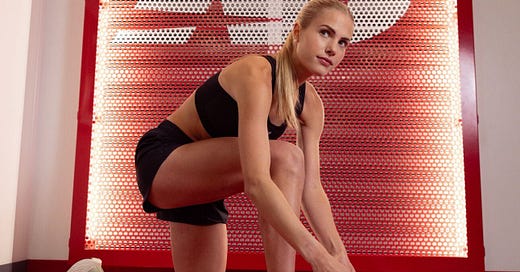And The Nominees Are... ⏱️
Lap 191: Sponsored by Wahoo

Learn more about Wahoo’s KICKR RUN treadmill here.
KICKR RUN - a new revolutionary treadmill offering the freedom and form of outdoor running at home, from Wahoo Fitness. Run hands-free and focus solely on the joy of running with the innovative RunFree Mode - which adjusts to your stride and pace automatically. For the first time runners can now fully benefit from indoor training apps such as Zwift Run and the Wahoo app for an immersive training experience that delivers unmatched realism and results. Learn more about Wahoo’s KICKR RUN treadmill.
Compiled by David Melly, Paul Snyder, Jasmine Fehr, and Audrey Allen.
Making Our Early Picks For Athletes Of The Year 🏆
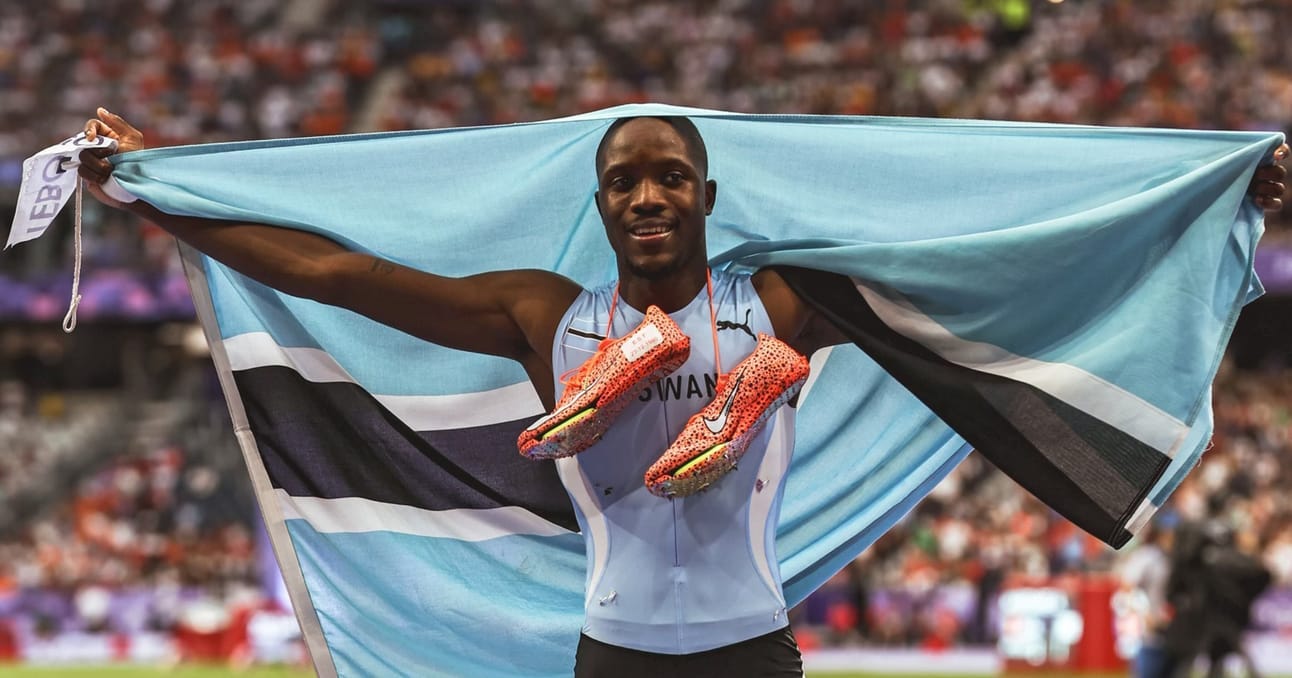
Letsile Tebogo after claiming Olympic gold in the 200m, becoming the first-ever gold medalist from Botswana. (Photo by Justin Britton / @justinbritton)
World Athletics has announced the nominees for its annual men’s and women’s track and field athletes of the year. And while there may be a few noticeable omissions – Keely Hodgkinson, Winfred Yavi, and Quincy Hall all spring to mind – winnowing down the entire sport’s pool of athletes into 22 nominees is no enviable task.
While naming a handful of nominees per category allows WA to diplomatically acknowledge a handful of stars, it’s ultimately you – the fans – who are tasked with selecting the winners via social media vote. Aristotle first wrote about the wisdom of the crowd all the way back in the 4th Century, BCE. And while “social media” and “wisdom” appear rarely in the same sentence, there’s something beautiful about democratically-selected awardees.
Now, we don’t want to put our thumbs on the scale too heavily, but if the ballot came down to the opinions of one newsletter, here’s where we’d land:
Women’s Field Athlete of the Year
A classic hypothetical among track and field fans is “would you rather win an Olympic gold medal or set the world record?” It’s a revealing Rorschach test of sorts for what a person values in their own lives: historic excellence as an individual or perseverance over all challengers. Well, if you’re asking that question to Yaroslava Mahuchikh, she conjured up a third option: both.
The Ukrainian high jumper cleared the bar in world record fashion (2.10m) at the Paris Diamond League meeting in July, then returned to Paris a month later to strike Olympic gold. She also won the European Championship as well as the Diamond League final, and went undefeated in outdoor competition. You really can’t ask for anything more than that.
Men’s Field Athlete of the Year
It’s not an interesting pick, but it’s the inevitable one. There is no figure in track and field today as dominant – or synonymous with their event – as Mondo Duplantis in the pole vault. Like Mahuchikh, Duplantis sored to an undefeated outdoor campaign, won gold at Euros, the Olympics, and the Diamond League final, and raised the bar on the previous world record (his own, several times). For good measure, he went undefeated indoors, too, including securing World Indoor gold.
You’ve gotta feel some level of pity for the great Ryan Crouser, who won his third straight Olympic title and is inarguably the greatest shot putter in history, but still gets overshadowed. Perhaps if he’d broken either of his own world records this year (indoors or out – he owns both) he’d be able to finally topple the pole vault GOAT in this category, but alas, he’ll have to settle for two global gold medals. So sad.
Women’s Track Athlete of the Year
Here’s a fun one. This was a banner year for women’s track, across basically every event. World records were lowered, iconic races won, and global medals awarded to tiny nations’ enormous stars. There are a lot of ways to go here – do you reward being the best ever in your specialty event? Racing often and beating everyone? Or picking up hardware in multiple events?
The obvious choice might be Faith Kipyegon, who picked up her third Olympic title and fourth straight global gold in the 1500m and added a 5000m silver to her medal shelf. She also broke her own world record and extended a multiyear undefeated streak in her specialty event. The only real knock on Kipyegon is that she started her season late due to a small winter injury. Gabby Thomas didn’t complete an undefeated season, but she did pick up three Olympic golds in the 200m, 4x100m, and 4x400m and has to get some measure of credit for her commitment to building the sport more broadly through her involvement with the Athlos NYC event. But in the interest of rewarding excellence, consistency, and fearlessness, we’re going to hand this one to Dominican sprinter Marileidy Paulino, who emerged from a banner year in the women’s 400m undefeated over 11 races with Olympic gold and the fastest time on the year to boot.
Men’s Track Athlete of the Year
Only one nominee in this category picked up multiple Olympic medals in individual events: Noah Lyles, the 100m champion and 200m bronze medalist. And whether you love him or hate him, it’s also hard to argue that anyone has worked harder to bring attention to the sport of track and field. But Lyles is the reigning Track Athlete of the Year and given that he picked up three gold medals in Budapest, only picking up a gold and a bronze in Paris has to be seen as a bit of an underperformance by his astronomically-high standards.
But what about a wide-angle view on one athlete’s impact on the sport? When Letsile Tebogo claimed Olympic gold in the 200m, he became the first ever gold medalist from the nation of Botswana. He was also the first ever 200m gold medalist from the entire African continent, and the first African man to win a medal of any type in the event since 1996. Upon his return home from Paris, he was treated to a parade in celebration of his feats – he also secured a silver medal in the 4x400m thanks to an incredible anchor leg – which drew 30,000 Batswana to the streets.
A Busy Week For Grand Slam Track 🤠

Three of Grand Slam Track’s newest signees: Jasmine Jones, Rushell Clayton, and Shamier Little. (Photos by Kevin Morris / @kevmofoto)
BREAKING NEWS: a high-profile Olympic medalist has signed with the Grand Slam Track League, committing to eight races over four meets throughout the 2025 track season, thrilling fans of championship-style racing and head-to-head competition. Stop me if this sounds familiar or repetitive… because the deep-pocketed masterminds over at Kyle Merber’s new office have been extra busy this week.
Yesterday, 11 new Racers were rolled out, bringing the grand total up to 30. The new crop of athletes included Olympic champion Marileidy Paulino, multisport fan favorite Devon Allen, and representation from seven different nations. You can find more information on the latest signees here.
Four of the twelve categories now have a full roster of “Racers,” the in-house talent committed to taking on a rotating cast of challengers over the course of the season. Now that those slots are filled, we get to embark on an exciting next step in the sports-fan process: speculating about how the competition will play out months before the first spike is laced up.
W100m/100H: Who’s got the flat speed?
Racers: Masai Russell, Cyrena Samba-Mayela, Jasmine Camacho-Quinn, Ackera Nugent
For the last several seasons, the women’s 100m hurdles has been one of the most exciting events in track and field because: the top-tier athletes are historically fast, and they race each other very often. With the full Paris Olympic podium plus the fastest woman of 2024 signed to the league, those elements remain in place headed into 2025. Nugent, Russell, and Camacho-Quinn are all in the top-10 all-time with lifetime bests of 12.24, 12.25, and 12.26. In all likelihood, this quartet will shuffle places like a deck of cards on the hurdles side.
So who takes home the glory (and the riches) will come down to how things shake out in the flat 100m. Nugent has the fastest lifetime best at 11.09, but she ran that time back in 2021 and none of her competitors have seriously focused on the 100m in recent seasons. The intrigue here is the total mystery offered by 50% of the races on tap.
M200m/400m: How fast can they go?
Racers: Quincy Hall, Matthew Hudson-Smith, Muzala Samukonga, Jereem Richards
2024 was a real “iron sharpens iron” year in the men’s 400m. The top four finishers in Paris (also the four GST signees) all ran their lifetime best in the final, and the gold and silver medalists, Hall and Hudson-Smith, both clocked three sub-44s apiece despite only breaking the barrier for the first time this year. It’s clear that the rising talent and wide variety of racing styles in the event have forced everyone to level up, and now Wayde van Niekerk’s 43.03 world record doesn’t seem nearly quite as far off as it did twelve months ago. And what better place to take it down than in a league founded by Michael Johnson?
W400m/400H: How will the “Sydney Effect” shape the field?
Sydney McLaughlin-Levrone, Jasmine Jones, Shamier Little, Rushell Clayton
Unless something dramatic and unexpected happens in the offseason, there isn’t a lot of ambiguity around the eventual winner of the women’s “long hurdles” category. It’ll be Sydney McLaughlin-Levrone, the best 400m hurdler in the world and a sub-49 flat 400m runner to boot. The more interesting questions from SML joining MJ’s ostensibly competition-focused league is how eight non-championship races a season will impact McLaughlin-Levrone’s training style and whether four shots at the 400m are enough for the 25-year-old to challenge Sanya Richards-Ross’s American record (she’s only 0.04 seconds off).
But McLaughlin-Levrone’s dominance tends to drag her competitors to historic times as well, and it wouldn’t be a surprise to see someone like 22-year-old Jasmine Jones make a huge jump forward simply by chasing her fellow American around the track all season. The third, fourth, and fifth fastest runners on the 400H all-time list all have one thing in common: they ran their lifetime bests in a race won by Sydney McLaughlin-Levrone.
M800/1500m: How will tactics affect point totals?
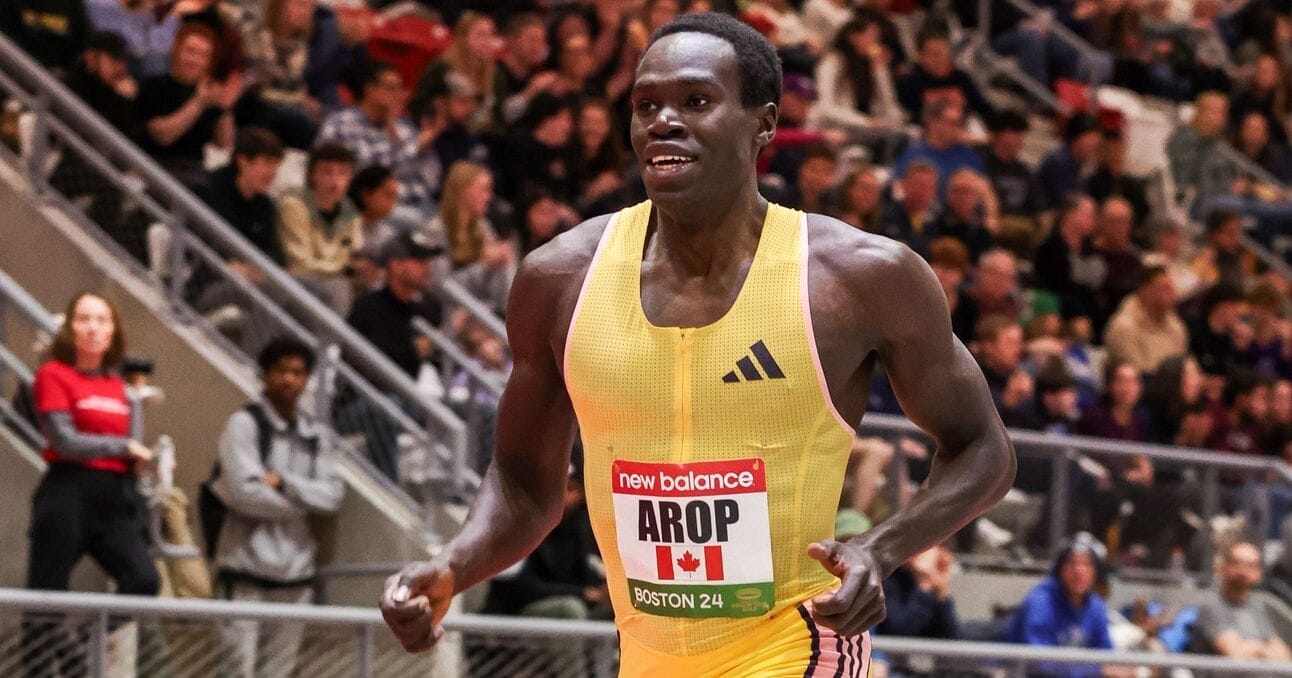
World champion and Olympic medalist Marco Arop was announced as one of Grand Slam Track’s newest signees. (Photo by Kevin Morris / @kevmofoto)
Josh Kerr, Cole Hocker, Yared Nuguse, Marco Arop
The addition of reigning 800m World champion Marco Arop to a group that, before yesterday, was full of 1500m specialists throws an interesting wrench into the “short distance” category. Arop can likely run away from any miler in the first lap of an 800m, and conversely, he’s probably vulnerable to a hard push from two laps out in a 1500m. Here, the identities of the four Challengers in any given meet may play a big role in the eventual point totals. If Arop can drag out a couple fellow 1:41 guys far enough ahead of the milers so they can only kick up to fourth or fifth place, he can use the field to limit how dangerous his main competition will be. And if Kerr, Hocker, or Nuguse is smart, they won’t want the longer event to come down to a battle of pure footspeed against a guy who’s run a 46.10 open 400m.
Ideally, the whole point of the Racers vs. Challengers format is that you get an intriguing mix of season-long narratives and unique race dynamics. So far, it seems like the fields that have delivered on that promise – and with roughly half the field yet to be announced, the news will hopefully continue to feel more like the Avengers assembling and less like Groundhog Day.
Sponsored by Olipop

Take 25% off your order at DrinkOlipop.com by using code CITIUS25 at checkout.
This fall, skip the pumpkin spice and embrace the OG autumn flavor—apple! Olipop’s Crisp Apple Soda tastes just like biting into a freshly picked apple with the perfect balance of sweetness and refreshment. Made with real apple juice and prebiotics, it’s a deliciously healthy way to satisfy your fall cravings. Good news: It is now a year-round favorite, grab a case today and enjoy the crisp taste of fall in every sip! Get 25% off your order at DrinkOlipop.com by using code CITIUS25 at checkout today.
The State Of NCAA Cross Country Heading Into The Postseason ⚔️
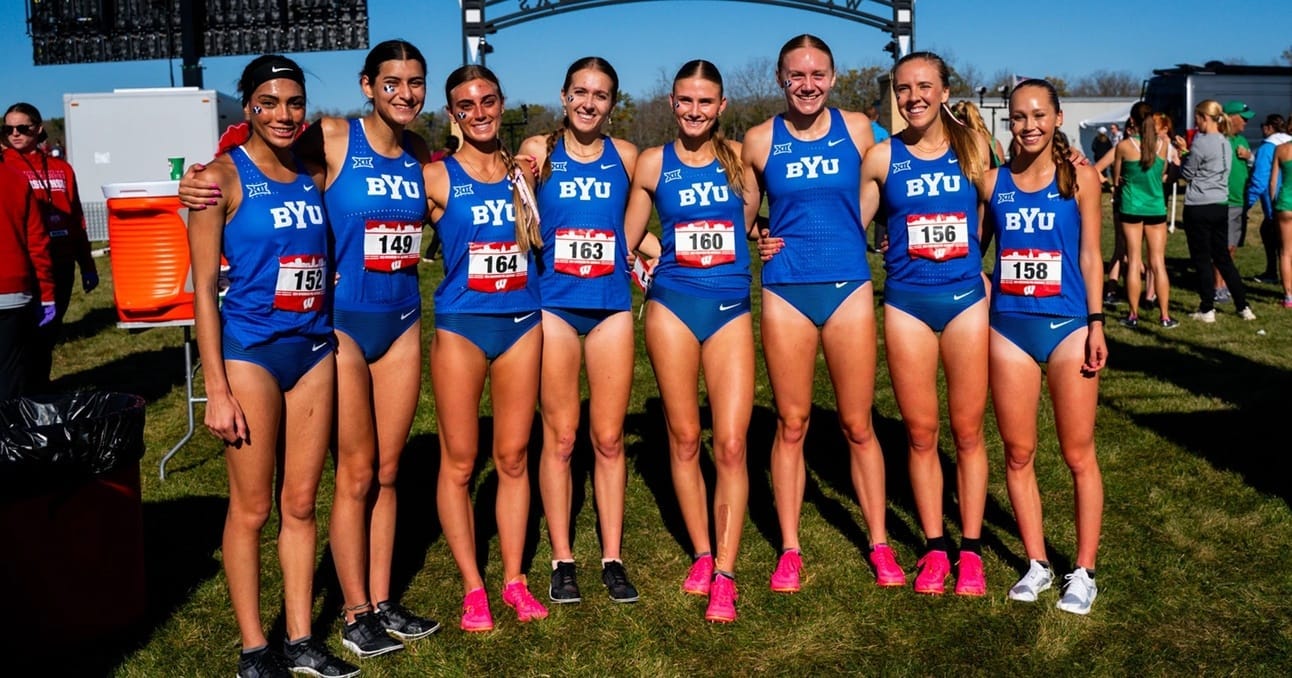
BYU’s women’s team after winning Pre-Nationals last weekend in Wisconsin. (Photo courtesy of BYU Athletics)
The grass is mowed, the fitness is sharp, and the injuries are being kept at bay by KT tape and prayer. That’s right; it’s nearly the NCAA postseason. We’ve got about a week left before teams don their best matching sweatsuits, business casual attire, and/or Halloween costumes and head off to their respective conference championships.
So where’s everybody at? We’ve got plenty to unpack heading into an exciting month of postseason racing ahead:
The Big 12: Early in the season, the No. 1 ranked OSU men cleaned up on their home course at a low-profile meet with a season-best 18 points. A week before, the No. 2 ranked BYU men posted a perfect score with a 5.7-second spread at the more competitive Dellinger Invitational. The national champion won’t be crowned three weeks early at Big 12s, but all eyes will surely be on the OSU-BYU dogfight and its team title implications. The individual title race is also set to be a mishmash of Cougs and Cowboys, with names like Casey Clinger, Denis Kipngetich, and Brian Musau standing out amongst the bunch, but don’t count out Solomon Kipchoge – the 28-year-old freshman won the Arturo Barrios Invitational last Friday in a stopwatch-breaking time of 22:01.
Also at Dellinger, the Utah women validated their No. 6 ranking by placing five in the top 10, establishing themselves as a longshot threat to thwart a BYU team sweep in Waco. West Virginia’s Ceili McCabe is the odds-on favorite to win her third Big 12 cross country title after redshirting last fall. The Canadian senior finished fourth at Pre-Nats in Madison last week and leads a Mountaineers squad that just jumped 24 spots(!) to No. 4 in their quest for an upset of BYU. The case for the BYU women is simple: they won a clash of the five highest-ranking teams in the nation at Pre-Nats by a margin of 52 points and sit ranked No. 1 in this week’s USTFCCCA Coaches’ Poll.
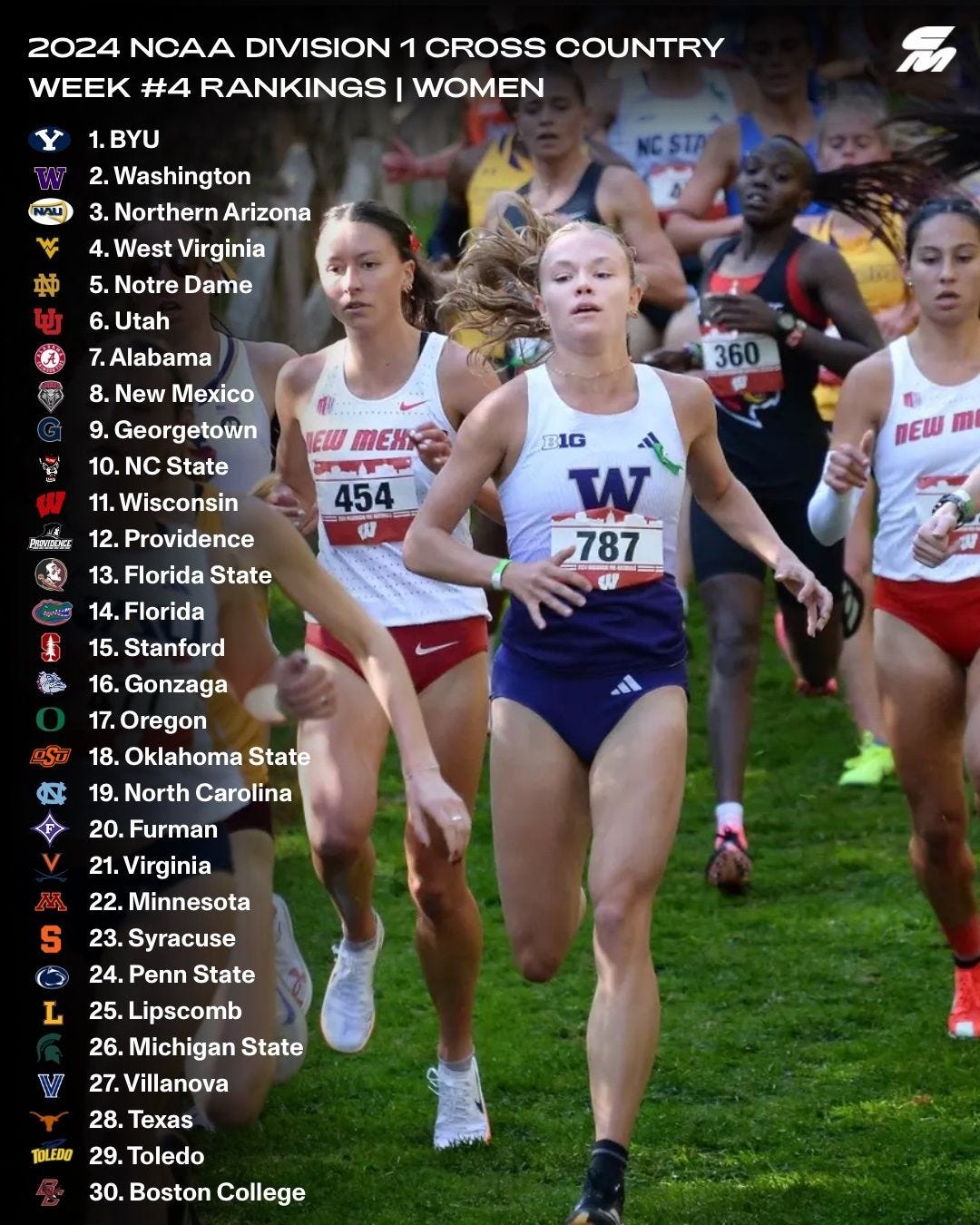
USTFCCCA Week 4 rankings | Women (Photo courtesy of UW Athletics)
The SEC: At the Crimson Classic, the ‘Bama women backed up their No. 7 ranking, going 1-2-6-7-12. This included an ostensible tie between undefeated Doris Lemngole and meteoric riser Brenda Tuwei. Both are set for a showdown in Texas next week against former teammate Hilda Olemomoi, now competing for Florida, who finished runner-up in Wisconsin on Saturday. Will the Tide roll over Hildamania? We’ll find out in about nine days. On the men’s side, No. 3 Arkansas are on track to defend their conference title after a leading team performance at Pre-Nats. The individual race is shaping up to be a battle of Kiprops (no relation) once again, as two-time defending champ Victor of Alabama will try to stave off a challenge from last year’s runner-up Patrick of Arkansas.
The Big 10: Despite the addition of Oregon and Washington, expect Wisconsin’s Bob Liking to win the men’s individual title for the fourth year straight. Bob finished 31 spots ahead of the next closest Big Ten runner at Pre-Nats. However, UCLA’s Michael Mireles has emerged as a dark horse candidate to win the first Big Ten title in school history after his sixth-place showing at Dellinger earlier this month. The team race is sure to be hotly contested as the Badgers vie for their seventh straight conference title, but the Ducks and Dawgs won’t go down without a fight.
On the women’s side, there are a handful of challengers to the crown that’s been held by Ohio State’s Addie Engel each of the last two years. Oregon’s Maddy Elmore’s only appearance this fall was a dominant win in Eugene two weeks ago, but Penn State’s Florence Caron might be the favorite when judging total body of work. The Quebec native has finished no worse than third across three races, with her most recent performance being an impressive third-place showing at the Princeton Fall Classic. The team race seems a bit more cut and dry, as the No. 2 ranked Washington squad has been racing unbelievably well this year, even with last year’s ninth-place finisher at NCAAs, Amina Maatoug, not quite looking like herself so far. If the Duke transfer can rediscover her 2023 form, it’s all but a lock for the Huskies.
The ACC: Clemson’s Gladys Chepngetich, Judy Kosgei, and Silvia Jelelgo will most likely be up front and contending for individual glory, but NC State’s Grace Hartman will look to break up the pack of Tigers. The Wolfpack junior finished behind the Clemson trio in an early-season 5K, but has since run two solid 6Ks. The men’s race is Parker Wolfe’s to lose, which is something he rarely does in championships. His only race so far this season was a Nuttycombe victory in 23:04, showing he’s still the top dog… or wolf.
The Stanford men will look to continue their hot streak after a third-place finish and 28-second spread at Pre-Nats. That performance pumped their ranking from No. 9 to No. 5 past new conference rivals Notre Dame, who dropped from No. 5 to No. 10. A potential confounding variable is Wake Forest, who won at the Panorama Farms Invitational, without Nuttycombe runner-up Rocky Hansen. The NC State women don’t usually need home field advantage to win, but they’ll want every edge this year as they fell short by 77 points to Notre Dame in their head-to-head contest at Pre-Nats.
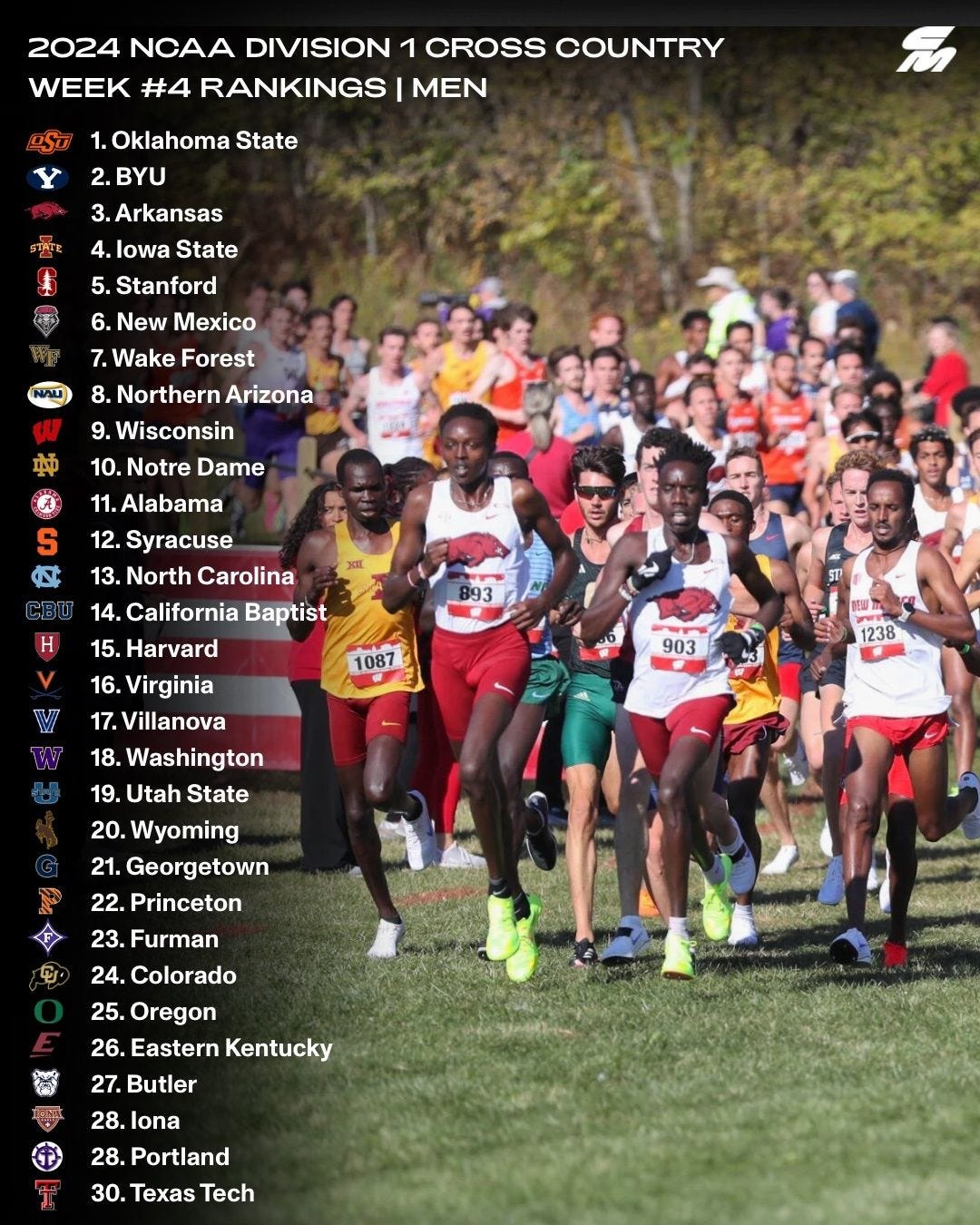
USTFCCCA Week 4 rankings | Men (Photo courtesy of UNM Athletics)
Mountain West honorable mentions: New Mexico athletes made a resounding statement over the weekend at Wisconsin’s Zimmer Championship Course, winning both individual titles in course record fashion. Pamela Kosgei led six runners under Parker Valby’s previous 6K course record of 19:17 and was the first woman to break the 19-minute barrier on “the Zim.” Meanwhile Habtom Samuel – who beat defending NCAA XC champion and Olympian Graham Blanks of Harvard by a sizable seven-second gap – shaved 30 seconds off UNC’s Parker Wolfe’s fresh course record from Nuttycombe just a few weeks ago with a 22:33 finish.
Rob Conner's Insights From 35 Years As Portland's Head Cross Country Coach ⚓️

University of Portland’s legendary “RC” (Photo courtesy of UP Athletics)
For this week’s coach spotlight, Jasmine Fehr caught up with Rob Conner, head coach of the University of Portland’s men’s cross country and track program. The coach more commonly known as “RC” is in his 35th year with the Pilots, having competed for the team himself before transitioning to coaching in 1990.
During his tenure with the Pilots, RC has led the men to 23 appearances at the NCAA Cross Country Championships, including ten top-ten finishes. In a span of four years, the Pilots captured three podium finishes: third in 2014, second in 2017, and third in 2018.
In our interview, RC reflects on his decades of experience coaching at Portland, how he’s created a legacy of distance running success at one of the smallest Division 1 schools in the NCAA, what guides his recruiting process, and more of his insights as a leading coach in the sport.
The following interview excerpt with Rob Conner has been edited lightly for length and clarity. You can read the full interview here.
Jasmine Fehr: Looking back on Portland’s legacy, it's not uncommon for the team to have a couple low key meets and then show up when it matters most. Portland has a history of being a dark horse.
Rob Conner: We want to always remember we're one of the smallest Division I schools. We have around 4,000 students, so we never want to take that for granted. Everything we've accomplished over the years has been about beating the odds. We've made it to 17 of the last 19 nationals. If you take our last 17 trips to NCAAs, we've averaged 11th place. It's crazy to think of such consistency and production from a small school.
[We’ve had three] top-three finishes: third, second, and third. Over the last ten years, we have fallen into one of only six programs that have done that. NAU has done it eight times out of the last 10 years. That's pretty impressive, obviously. BYU has done it five times, and Oklahoma State has done it four. Then the University of Portland has done it three times, along with Stanford and Colorado. It's crazy what our guys have accomplished.
It's a strange world right now with the publicity of all this recruiting on Instagram and such. One year we had a recruiting class that I thought was number one in the nation and it just happened to be the one year that FloTrack didn't do their preseason recruiting rankings. So we get who we get and we've kind of been a destination for transfers.
Speaking of recruiting, what are your thoughts on the increased number of international athletes and older athletes entering the college system? There's been a lot of recent changes and the NCAA probably looks different from when you first started coaching.
I don't want to be a sour grapes guy, but if you want to pay the $12,000 or $15,000 to the recruiting agency to get one of those top Kenyans, I've got [that agency’s] number. [They’re] doing a great job sending over the big-time guys to the NCAA. These are guys who probably should have professional shoe contracts, but I think that money is getting harder to come by now. So these great athletes are coming over to the NCAA, all through one agency. We're just not going to be able to pay the money to get those emails.
That’s the situation, but so what? Last year at nationals, I had four guys out of my top seven that had run slower than 9:20 for two miles in high school. We're not going to win with those four guys being on our seven, but it was very satisfying as a coach to work with kids and have them train hard enough to go to the national meet.
When we got second at NCAAs, we had four homegrown guys on the team. We had Jeff Thies, Nick Hauger, Caleb Webb, and Logan Orndorf – that was our core. Then we had one graduate transfer and two international guys. One of the international guys was the number one man and the other was number seven. So that core four is what got us second at NCAAs.
One year we had a team where all seven guys were within a five-hour drive from campus and we took seventh at NCAAs. That's special.
It took me about 15 years, maybe 20 even, before I had a varsity runner from the state of California. Then over the last 10 to 12 years, we've had several state champs. It's never been easy. We're going to work with who we get and give them a positive environment to maximize their ability. We have a really wide variety of people and it's fun to work with all of them to see what they can accomplish.
Looking back over your long career in coaching, do you have a favorite memory that sticks out to you?
I always bring myself back to the start of the program, to the start of my career when I sat down in the office. The first two guys to meet me and talk training were Pete Julian [now coach of the Union Athletic Club] and Ian Solof [now the University of Portland women’s cross country coach]. They were teammates in high school. I told them, ‘Hey, we can qualify for nationals.’ And in ‘93, we won regionals. That year we had five seniors that we built up and I was like, ‘We may never make it to NCAAs again.’ Boy, that was special. We got 12th place, our first-ever time, and it was a disappointing 12th. Those guys were setting the course for us in hard work, goal setting and trying to achieve something.
Rapid Fire Highlights 🔥

Parker Valby signed with New Balance and will join Mark Coogan’s pro group in Boston. (Photo courtesy of New Balance)
– In a win for East Coasters everywhere, Parker Valby has signed with New Balance and will join Mark Coogan’s crew in Boston. While no details have been released on what he meant by this, Valby’s father-turned-agent is promising more surprises to come from this “historic” deal.
– The trailer for the second season of Netflix’s SPRINT has been released, and based on this particular two-minute clip, it appears all the major players from Paris will get at least some on-screen time.
– At the Amsterdam Marathon, Yalemzerf Yehualaw won in a course record of 2:16:52, while Tsegaye Getachew took top honors for the men in 2:05:38. More like AmsterDAMN!
– At the Toronto Waterfront Marathon, Mulugeta Asefa Uma was the fastest fella, going 2:07:16, while Waganesh Mekasha made it an Ethiopian sweet atop the podium, besting the women’s field in a new course record of 2:20:44. You can rewatch all the action along with the CITIUS MAG crew free on YouTube.
– Olympic 10,000m champ Joshua Cheptegei won the Delhi Half Marathon in 59:46, while Alemaddis Eyayu took the women’s title in 68:17. Welcome news for Scottish athletics fans came as well with Eilish McColgan took fourth in 69:55, her third half marathon of the fall.
– The weather has to be really bad for a 23,000-participant race to get canceled, but that’s just what happened in Portsmouth as the 10-mile Great South Run, originally scheduled for Sunday, October 20, was nixed due to wind and rain.



